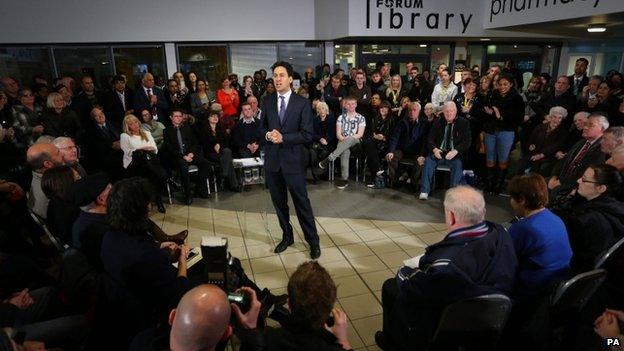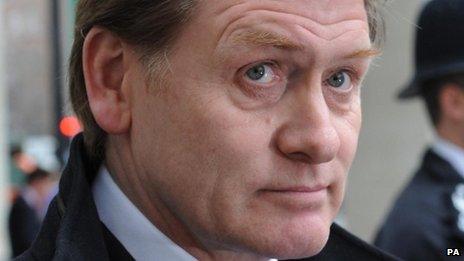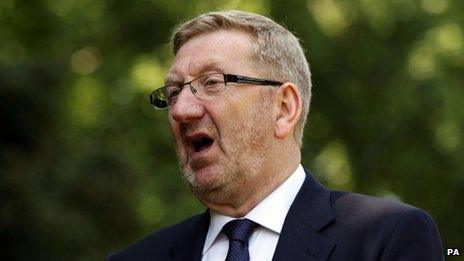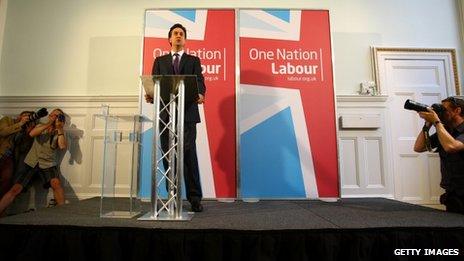Labour's union shake-up revealed
- Published

Labour is reforming its relationship with the trade unions - as well as with its members and supporters
Labour leader Ed Miliband is set to announce a shake-up of the party's relationship with the trade unions, the BBC has learned.
Affiliated unions will no longer control a third of the votes in Labour leadership elections, under Mr Miliband's plans.
The reforms will give ordinary Labour supporters - as well as party members - more say over who leads them.
The party's leader has described his proposals for altering the century-old link between Labour and the unions as "a huge change".
Yet they grew from what was initially a little local difficulty.
Special conference
The bitter battle to select a Labour candidate for the central Scotland seat of Falkirk threw up allegations of vote-rigging and undue trade union influence.
A report on the controversy was sent to the police and the national media alerted.
So Mr Miliband dusted off an idea that was gathering a little dust on his shelves, and he declared last summer that he would end "machine politics" and mend - though not end - the relationship with the unions.
Although the police ultimately took no action over Falkirk, and an internal party investigation couldn't prove any wrongdoing, the process of change had begun - with a special conference scheduled for next month to rewrite Labour's rule book.

The debate over union involvement in Labour's selection battles began when Eric Joyce stood down
Intense discussions with the unions in what are now smoke-free rooms began under the auspices of a former general secretary of the party, Ray Collins, and there were times when those close to the Labour leader felt he could be on the brink of humiliation.
Just a few weeks ago, one union general secretary declared that talks had broken down.
But that relationship was mended too, and at least some of the likely changes - which Ed Miliband is due to set out in Saturday's Guardian - are as radical as he had hoped.
He will deliver on his pledge that trade union members will no longer be affiliated by their leaders en bloc to the Labour party - unless they write to their union to object.
Currently three million trade unionists are affiliated to Labour and from that the party gains around £8m in affiliation fees.
Instead the process will be stood on its head.
In future, individual trade unionists will be asked if they wish to give any money to Labour, and if they wish to become an 'affiliated supporter'.

A row over the involvement of Len McCluskey's Unite union in the Falkirk seat led to Mr Miliband's changes
Some union leaders believe only around 10% of their members will choose to give money to Labour and have this kind of individual association with the party - costing the official opposition millions of pounds in affiliation fees.
Pre-empting the changes, the GMB union has already cut the fees it pays to Labour by 90%.
So, fearing a shortage of cash before the election, Labour officials have agreed that the changes will be phased-in over a five year period.
Critics will say Ed Miliband has blinked first when faced with the prospect of emptying coffers and delayed his changes.
Labour argues that independent figures who have tried to grasp the thorny issue of party funding before - such as Sir Christopher Kelly and Sir Hayden Phillips - believe that a five-year transition isn't unreasonable.
As a potential incentive for union members to become so-called "affiliated supporters" they will be given a vote in any future leadership contest.
Critics inside as well as outside Labour have questioned whether this new system might increase, rather than decrease, union influence over the party.

Currently unions account for a third of the votes in any leadership contest; rank and file members get a further third, and MPs and MEPs the remainder.
Mr Miliband says it is more modern, open and democratic to sweep away the system that guaranteed his own victory and replace it with one member, one vote.
And maybe, just maybe, it will insulate him from the criticism that he is a creature of the union barons.
There are currently around 180,000 Labour members - but even if one in 10 of the three million trade unionists decide to become affiliated supporters, then 300,000 of them would easily be able to outvote the long-standing activists in any leadership contest.
And it would cost just £3 to become such a supporter, while (waged) party members have to cough up £45.50
But Labour officials say there are safeguards against undue influence.
Registered supporters
Currently the trade unions themselves ballot their own members when a leadership election is called.
There was criticism that, last time, some of them sought to influence the outcome by also sending members literature supportive of Ed but critical of his opponent, his brother David.
In future the party itself will control all ballot papers to ensure all candidates are treated fairly.
The unions will have no role in nominating candidates for leader - that privilege will remain solely with MPs.
And while candidates currently need the backing of only one in eight MPs to get on the ballot, in future they will need the support of possibly one in five or one in four - in practice, probably depriving trade unionists of more left-wing choices.
People with no connection to the unions could also have a say in the contest.
So long as they become 'registered supporters' of Labour and pay a small fee, they too will get a vote for the first time.
There are currently around 20,000 people who have chosen to register support without becoming full party members. Labour HQ wants to boost this number, partly as a counter-weight to those who come in through the trade union route.
Ed Miliband says this will ensure his party is more representative of working people.
And party members whose noses have been put out of joint by being told that they will have no greater say in electing a leader than a mere cut-price supporter are to be told that they will retain the rights over selecting parliamentary and council candidates and standing for office.
But critics will argue that all this is well and good, but the change in the relationship with the unions is more symbolic than real.
While the leadership rules will change, the unions will still wield 50% of the vote at the Labour conference - and will retain their influence on the National Policy Forum and the party's ruling National Executive.
And while union affiliation fees will inevitably fall, there will be no cap on union donations unless the Conservatives and Lib Dems agree to wider changes to party funding.
The unions, in other words, have got their way in retaining their collective voice.
Labour insiders say they hope to review all this after five years but the simple fact remains: if the unions continue to control half the votes at any conference that consider changes to the Labour rule book, then no significant reform can take place without having at least some of them on board.
But those close to Ed Miliband say the objective at what could have been a tricky special conference was to get "significant change" without leaving "blood on the carpet" just a year or so before the general election.
In purely party management terms, they will probably succeed.
But it will be for voters to judge whether Ed Miliband has been as radical in practice as his rhetoric had previously suggested in the wake of Falkirk.
THE KEY CHANGES:
•A new method of electing Labour's leader - the electoral college, which gives unions, party members and MPs/MEPs a third of the votes each, abolished in favour of one member, one vote
•MPs have sole nomination rights for leadership candidates and those candidates will need a higher level of support than at present - possibly 20% of MPs
•All union members will have to 'double opt-in' if they want to take part in a leadership contest. They have to say that they are content to give money to Labour AND that they want to become 'an affiliated supporter'
•Only full party members - not trade-union 'affiliated supporters' - will choose parliamentary and council candidates
•The next London mayoral candidate will be selected in the same way as the Labour leader
•New leadership rules will be put in place this year - but changes to the party's funding will be phased in over five years
- Published29 January 2014
- Published30 January 2014
- Published21 January 2014